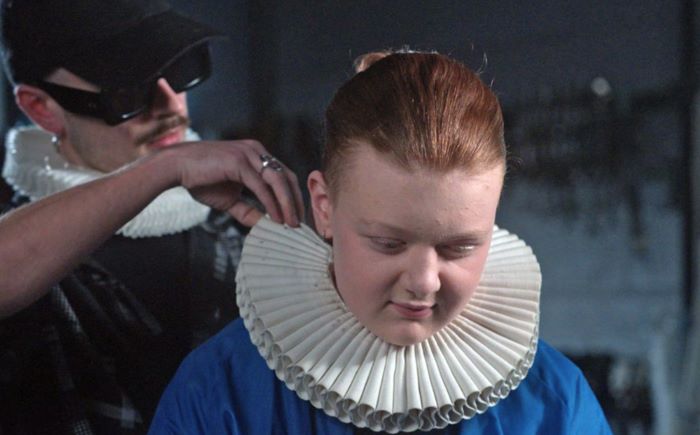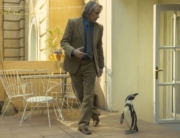The title of French-based writer and philosopher Paul B. Preciado’s debut documentary/essay suggests an individualized, perhaps straightforward story. Instead, it’s a collective, expansive artistic production. Playful but resolute, Preciado adapts the essence of Virginia Woolf’s Orlando: A Biography, a seminal queer text, to weave together testimonies and celebrations of trans life. In a myriad of settings, approximately 20 trans and nonbinary individuals, across a span of generations, tell their life stories, intermixed with reading passages from Woolf’s 1928 novel.
Occasionally and remarkably, the blending between the reading of and reenactment from the book and the assertions of the film’s subjects sometimes merge. Many participants take on the role of Orlando, while wearing mostly contemporary clothing, sometimes with white collar ruffs of the Elizabethan era. In interviews, their real-life stories are revealed plainly, head-on, while others are coyer, role playing within a staged space, as when a psychiatrist (actor Frédéric Pierrot) with antiquated views reacts to the feelings and experiences of one Orlando with unease and bewilderment. Throughout, Preciado’s voice-over bobs in and out to express the intentions of his piece—not to write (or film) a standard autobiography, as he believes Woolf has already written it, but to speak to Woolf directly. (“I am one of your Orlandos,” he says, and we as trans people “are changing the course of history.”)
An overriding sense of wit and freedom emerges as Preciado explores this territory in lively and purposefully nonbinary ways, with persistent blending of documentary and fiction, artifice and reality. (One episode from Orlando is filmed on a soundstage with faux snow falling in the background). Yet, the film is tethered to the life experiences of Preciado and his subjects (referring to the cast as “his subjects” feels antithetical to Preciado’s gathering—much of the film was cast out of hundreds of applicants). Even when the film journeys on more traditional routes, such as briefly employing archival footage of prominent trans figures of the past—Christine Jorgensen, Coccinelle, and Marsha P. Johnson—it vividly draws upon Preciado’s and the cast’s personal experiences and observations.
Jean-Luc Godard’s influence is evoked here and there in elements of color (those bright red main titles), composition, unconventionality, and cacophony. (The joyous theme song about hormone therapy, “Pharmcoliberation,” is performed as a dance number and as a screamo version). He died during the production, which is mentioned here by Jenny Bel’Air, a trans woman, now 70, who was formerly an icon of 1980s nightlife culture. Yet, Preciado’s film feels very fresh and vibrant and of his own.
In one sequence, surgery is performed upon a copy of Orlando. Text from the book (“Violence was all”) is excised from the page by the gloved hands of trans, masked surgeons, carefully taking scalpel to paper, as Preciado’s narration eloquently points to the first known gender-affirming surgery in the 1920s, the decade in which Orlando was published. Visually, this is a well-wrought sequence that, like much of this film, has a sense of delicacy, inventiveness, whimsy, and earnestness.







Leave A Comment